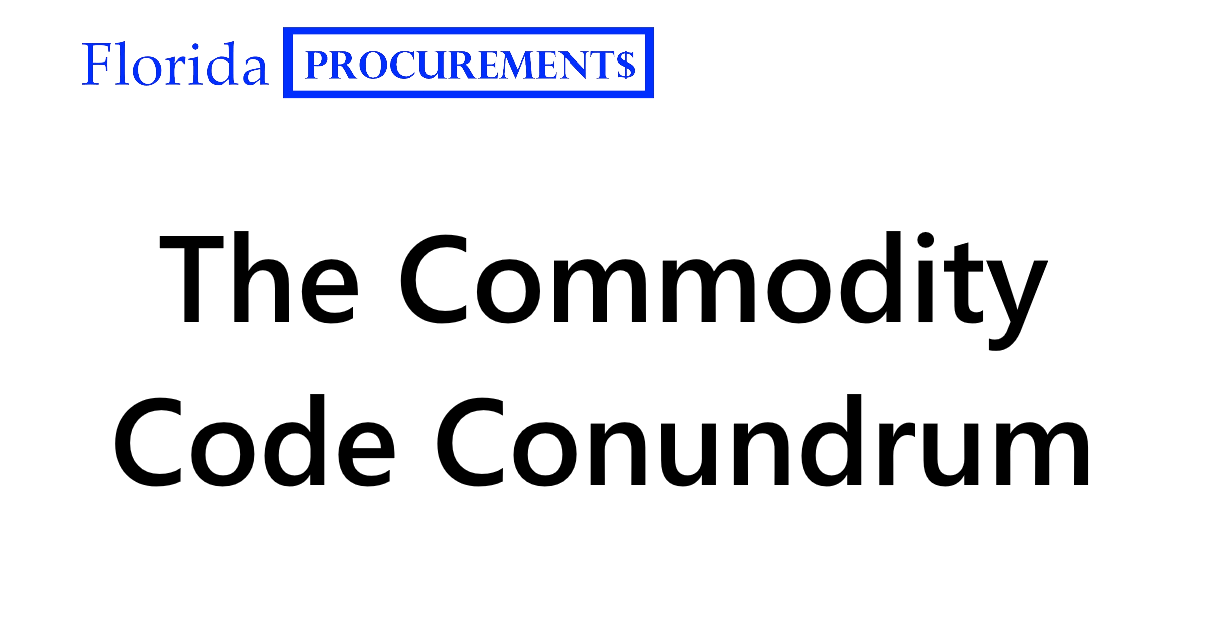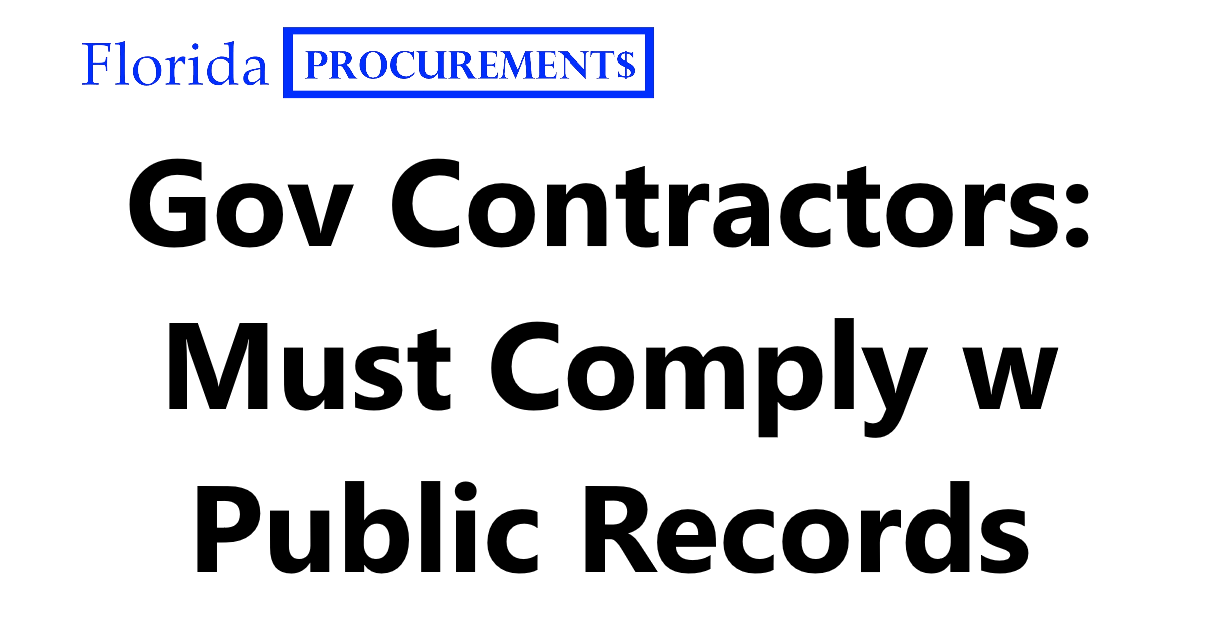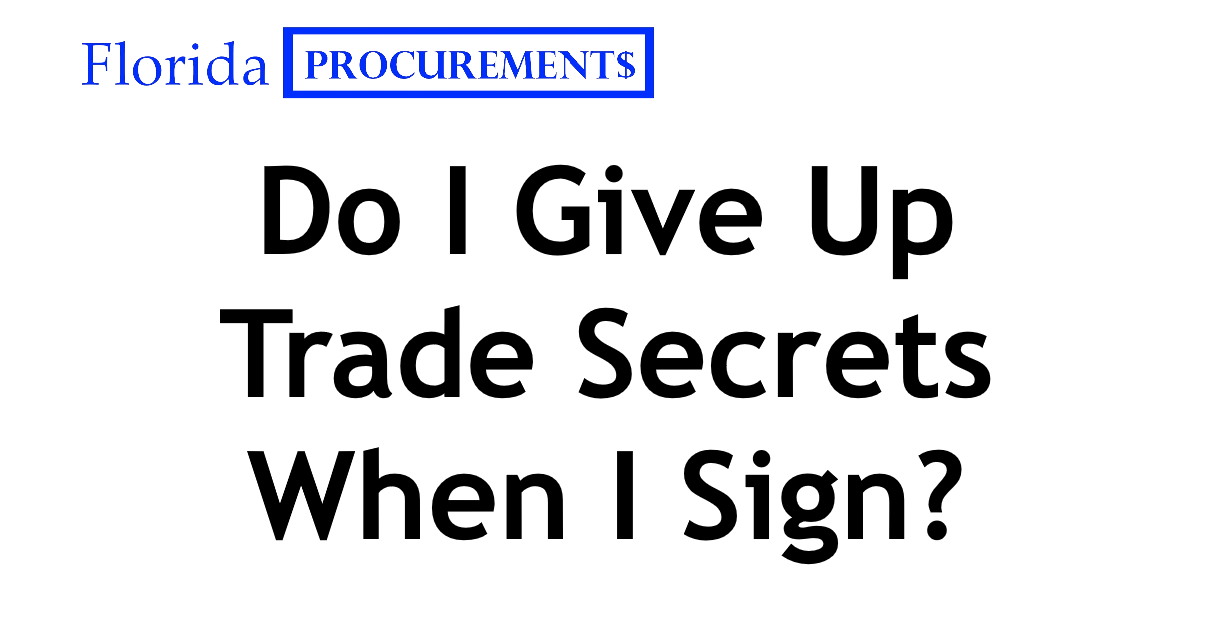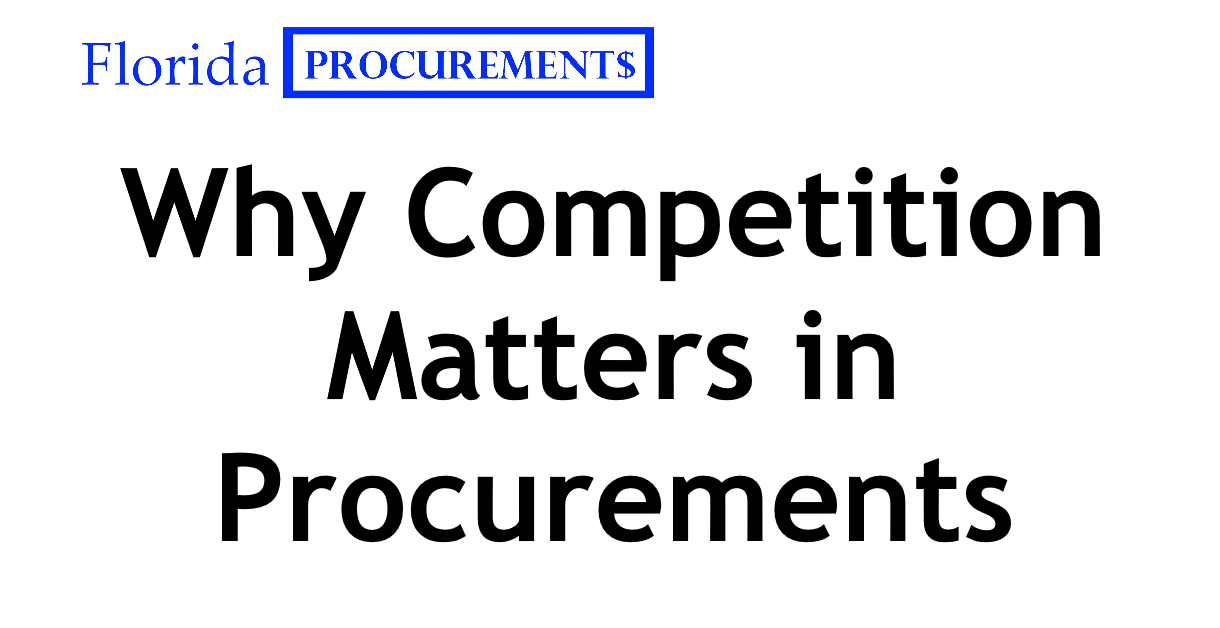
- March 27, 2025
- Sean Gellis
- 0
Welcome to FloridaProcurements.com (FlaProc), your authoritative resource for navigating Florida’s government contracting landscape, with particular focus on transportation and technology opportunities. FlaProc provides free, expert guidance to help companies identify and secure state contracting opportunities throughout Florida.
This resource is maintained by Attorney Sean Gellis of Gellis Law, PLLC, one of less than 75 attorneys Board Certified in State and Federal Government and Administrative Practice by The Florida Bar. Mr. Gellis brings unique insight to government contracting, having served as the Chief of Staff of the Florida Department of Management Services (DMS), General Counsel of the Florida Department of Transportation (FDOT), and Deputy General Counsel of the Florida Office of Insurance Regulation – positions that provided direct oversight of technology initiatives and issues of statewide importance. His record in bid protest litigation reflects the sophisticated advocacy and strategic thinking he brings to government contracting matters, particularly in complex transportation and technology procurements. Sean also leads Procurement Insider, a confidential subscription service that provides technology vendors with strategic intelligence and insider analysis of Florida government opportunities. Learn more about transforming your approach to government contracting at www.gellislaw.com/procurement-insider
The Hidden Barrier Between Vendors and Lucrative Government Contracts

In theory, Florida’s procurement system is designed to connect agencies with qualified vendors through a systematic approach. At the heart of this system lies the United Nations Standard Products and Services Code (UNSPSC) – a standardized classification system used by MyFloridaMarketPlace (MFMP) to categorize what the state buys and what vendors sell.
The concept seems straightforward: Vendors select commodity codes that match their offerings, and agencies select codes that match their needs. The system then automatically notifies relevant vendors when opportunities arise. Florida’s procurement professionals spend considerable time selecting what they believe are the appropriate codes to categorize their solicitations, while vendors diligently try to register for codes that represent their products and services.
But there’s a critical problem that costs technology vendors millions in missed opportunities each year. Despite best intentions on both sides, the commodity code system frequently fails to connect innovative technology solutions with the agencies that need them. This disconnect is particularly pronounced in rapidly evolving fields like cloud computing, cybersecurity, artificial intelligence, and data analytics, where terminology and categorization evolve faster than the classification system itself.
The Public-Private Sector Disconnect
Having overseen procurement operations at the highest levels of Florida government, I’ve witnessed firsthand how the commodity code system creates an unintended barrier between agencies and vendors – particularly in the technology sector.
The fundamental issue? Agencies and technology vendors speak completely different languages when it comes to categorizing products and services. This communication gap stems from fundamentally different perspectives: government procurement staff typically approach technology through administrative and budgetary frameworks, while vendors categorize their offerings based on technical capabilities and market positioning.
This disconnect is further complicated by the fact that many procurement professionals lack deep technical expertise, while technology sales teams rarely possess government procurement experience. The procurement staff member writing a solicitation might be handling everything from office supplies to complex IT systems, making it nearly impossible to master the nuanced terminology across all domains.
Consider these real-world examples:
- An agency seeking cloud migration services might select commodity code 81112101 (Internet service providers ISP), while qualified vendors have registered under 81111508 (Application implementation services). The agency views the need through the lens of internet services, while vendors categorize it as an implementation project.
- A department looking for cybersecurity solutions might choose 43233204 (Network security and management software), while vendors specializing in this area have selected 46171622 (Security surveillance hardware or controllers). The agency conceptualizes the need as software, while vendors might approach it as a comprehensive security system with hardware components.
- An IT modernization project might be coded under 80101507 (Information technology consultation services), missing vendors registered under 43232304 (Data conversion software). The agency sees the project primarily as a consulting engagement, while vendors focus on the technical data migration aspects.
The result? Critical procurement opportunities never reach qualified vendors, creating artificial limitations in competition and preventing agencies from accessing innovative solutions. This systematic issue undermines the very purpose of Florida’s procurement system: to create open, fair competition that delivers the best value for taxpayers while meeting agency needs.
Why Commodity Codes Fail Technology Procurement
The UNSPSC classification system faces several fundamental challenges when applied to modern technology procurement:
- Outdated Terminology: Many codes reflect outdated technology concepts and fail to capture emerging technologies and service models. The code structure was developed in an era when technology was more clearly delineated—hardware, software, networking—but today's cloud-based, integrated solutions often defy these traditional categories. For example, as-a-service offerings might encompass elements of hardware, software, networking, and professional services, none of which fit neatly into a single commodity category.
- Inconsistent Application: Agency procurement staff often have limited technical understanding, leading to inconsistent code selection. Without deep technical expertise, procurement professionals must make educated guesses about which codes best match their requirements. This creates enormous variation between agencies—and even between different buyers within the same agency—when categorizing similar technology needs.
- Categorical Misalignment: Technology solutions frequently span multiple categories, making single-code classification inherently problematic. A modern cybersecurity solution might incorporate elements of software, hardware, cloud services, artificial intelligence, and professional services. While procurement staff can select multiple codes, they often default to the category they perceive as primary, missing many qualified vendors in adjacent categories.
- Knowledge Gap: Most vendors lack expertise in government classification systems, focusing instead on industry-standard categorizations. Technology companies typically organize their offerings according to industry analyst frameworks (Gartner, Forrester, IDC) or technical capabilities, which rarely align with UNSPSC categories. Even sophisticated government affairs teams struggle to bridge this conceptual divide.
I’ve seen cases where technology procurements worth millions received fewer than three responses – not because qualified vendors didn’t exist, but because they never knew about the opportunity due to commodity code misalignment.
The Hidden Cost to Vendors and Agencies
This disconnect creates significant costs for both sides of the procurement equation, undermining the efficiency and effectiveness of Florida’s technology procurement ecosystem.
For Technology Vendors
- Missed business opportunities worth millions in potential revenue that never appears on their radar
- Wasted resources monitoring irrelevant opportunities that don't match their capabilities
- Competitive disadvantage against vendors with procurement specialists or insider connections who can navigate the system despite its flaws
- Frustrated sales teams chasing inconsistent leads and questioning why they miss opportunities they're qualified for
- Strategic planning challenges due to unpredictable opportunity flow and incomplete market visibility
- Diminished return on investment from government-focused sales and marketing resources that never reach their intended audience
For Government Agencies:
- Limited access to innovative solutions that could transform service delivery and operational efficiency
- Reduced competition leading to higher prices as fewer qualified vendors respond to solicitations
- Fewer responses to solicitations, sometimes forcing rebids or contract extensions that delay implementation
- Increased likelihood of failed procurements when the most qualified vendors never see the opportunity
- Perception of vendor favoritism when the same companies repeatedly win contracts, even when the issue is systemic
- Delayed technology modernization as procurement failures extend legacy system lifespans
The cumulative impact extends beyond individual missed opportunities. Over time, innovative technology companies may reduce their focus on Florida government or withdraw entirely, concluding that the procurement system is too opaque or inefficient to justify continued investment. This gradual erosion of the vendor ecosystem ultimately diminishes the state’s access to cutting-edge solutions.
The Procurement Insider Solution: Beyond Commodity Codes
Rather than expecting technology vendors to master the nuances of government classification systems, our Procurement Insider subscription offers a fundamentally different approach that transcends the limitations of commodity codes entirely.

Comprehensive Monitoring
We track all new technology procurements regardless of assigned commodity codes, ensuring no opportunity is missed due to classification errors. Our monitoring system examines solicitation content, not just categories, identifying relevant opportunities even when they’re miscoded or hidden under unexpected classifications. We look beyond the codes to understand what agencies are actually seeking.

Expert Translation
Sean understands both agency terminology and industry language, bridging the communication gap. We translate government procurement language into the terminology technology vendors actually use, making it immediately clear whether an opportunity matches your capabilities. This translation function eliminates the confusion caused by different categorization frameworks.

Direct Delivery
Relevant opportunities are delivered directly to your sales team in clear, actionable language that aligns with how you categorize your solutions. No more sifting through irrelevant notices or deciphering cryptic government terminology. Each opportunity is presented in a format designed for immediate understanding and action by technology sales professionals.

Strategic Context
Each opportunity includes analysis that explains not just what the agency is requesting, but what they’re actually trying to accomplish. Our insider perspective reveals the underlying needs driving the procurement, potential challenges in the agency environment, and critical success factors that aren’t apparent in the formal solicitation. This context enables more strategic pursuit decisions and stronger proposals.
Stop Missing Opportunities Hidden Behind Commodity Codes
Technology vendors shouldn’t need to become experts in government classification systems to compete effectively. The responsibility for connecting qualified vendors with appropriate opportunities shouldn’t fall on vendors trying to guess which arbitrary codes might be selected for relevant procurements. Procurement Insider eliminates this fundamental barrier by ensuring you never miss relevant opportunities, regardless of how agencies categorize them.
The commodity code conundrum represents a systemic issue in government procurement—one that undermines competition, limits innovation, and ultimately costs taxpayers through higher prices and suboptimal solutions. But while the system itself may resist change, your company’s approach to government business doesn’t have to be constrained by these limitations.
Our subscription service monitors all Florida technology procurements, translates government requirements into industry language, and delivers actionable intelligence directly to your team. Each opportunity comes with context that helps you understand not just what the agency is asking for, but why they’re asking for it and what successful implementation would look like from their perspective.
By transcending the commodity code system entirely, Procurement Insider creates a fundamentally different approach to government business development—one based on actual capabilities and needs rather than arbitrary classification codes. Stop wasting valuable resources navigating complex procurement systems and focus instead on what you do best – developing innovative solutions for government challenges.
The most successful technology vendors in government markets don’t compete based on their mastery of procurement minutiae—they win by understanding agency needs and demonstrating superior solutions. Procurement Insider handles the complex navigation of government systems so you can concentrate on the value proposition that actually wins contracts.
Contact us today to learn how Procurement Insider can transform your approach to government business and ensure you never miss a critical opportunity hidden behind commodity code confusion.
Sean Gellis is a Board Certified specialist in State and Federal Government and Administrative Practice with over a decade of government experience, including service as General Counsel of the Florida Department of Transportation and Chief of Staff of the Department of Management Services. Through Gellis Law, PLLC, he provides strategic counsel on government procurement, administrative law, and regulatory matters. Sean also leads Procurement Insider, a confidential subscription service that provides technology vendors with strategic intelligence and insider analysis of Florida government opportunities. Learn more about transforming your approach to government contracting at gellislaw.com/procurement-insider.








